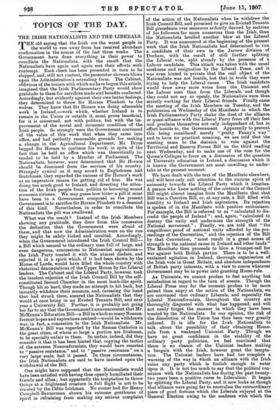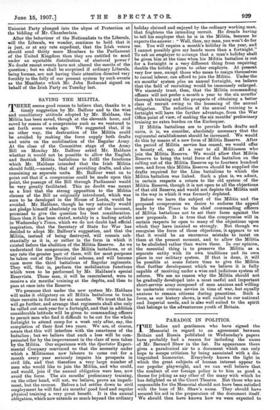TOPICS OF THE DAY.
THE old saying that the Irish are the worst people in the world to run away from has received abundant confirmation in the course of the last three weeks. The Government have done everything in their power to conciliate the Nationalists, with the result that the Nationalists have again and again met their efforts with contempt. Each cheek has been presented in turn to be slapped, and, still not content, the persecutor showers blows upon the Administration's retreating form. The Cabinet, oblivious of the truism with which we have begun this article, imagined that the Irish Parliamentary Party would show gratitude to them for sacrifices made and benefits conferred. Accordingly, but evidently against their own better feelings, they determined to throw Sir Horace Plunkett to the wolves. They knew that Sir Horace was doing admirable work in Ireland,—work which, whether Ireland is to remain in the Union or outside it, must prove beneficial, for it is concerned, not with politics, but with the im- provement of the moral and economic condition of the Irish people. So strongly were the Government convinced of the value of this work that when they came into office, and had perfectly reasonable grounds for making a change in the Agricultural Department, Mr. Bryce begged Sir Horace to continue his work, in spite of the fact that be held an office which was theoretically in- tended to be held by a Member of Parliament. The Nationalists, however, were determined that Sir Horace should be dismissed from the services of his country. Strangely cynical as it may sound to Englishmen and Scotchmen, they regarded the success of Sir Horace's work ag an imperative reason for getting rid of him. He was doing too much good to Ireland, and diverting the atten- tion of the Irish people from politics to becoming sound economic citizens. We may guess how bitter a pill it Must have been to a Government composed as the present Government is to sacrifice Sir Horace Plunkett to a demand of this kind. Nevertheless, in order to conciliate the Nationalists the pill was swallowed.
What was the result? Instead of the Irish Members showing any gratitude, they drew from this concession the deduction that the Government were afraid of them, and that now the Administration were on the run they might be safely kicked and insulted. Accordingly, when the Government introduced the Irish Council Bill- s Bill which seemed to the ordinary man full of large, and even dangerous, concessions to Nationalist aspirations— the Irish Party treated it with the utmost disdain, and rejected it in a spirit which, if it had been shown by the House of Lords, would have filled the whole country with rhetorical denunciations of the UpperHouse by the Liberal leaders. The Cabinet and the Liberal Party, however, took the insolent rejection of the Irish Council Bill by the self- cOnstituted Second Chamber in the most lamb-like spirit. Though hit so hard, they made no attempt to hit back, but instantly withdrew their measure, and, caressing the hand• that had struck them, assured the Nationalists that they would at once bring in an Evicted Tenants Bill, and next year a University Bill. Further, it is probably not going too far to say that the Government's announcement that Mr. McKenna's Education Bill—a Bill in which so many Noncon- formist hopes and aspirations centred—would be withdrawn was, in fact, a concession to the Irish Nationalists. Mr. Mclienna's Bill was regarded by the Roman Catholics in the great cities, of whom so large a portion are Irishmen, to be specially unfair to them. So unfair, indeed, did they consider it that it has been hinted that, copying the tactics of the extreme Nonconformists, they would have resorted to "passive resistance," and to "passive resistance" on a very lame scale, had it passed. In these circumstances, the Irish Nationalists are said to have insisted upon the withdrawal of the Bill
One might have supposed that the Nationalists would have been satisfied with having thus openly humiliated their friends and allies ; but apparently the temptation to throw things at a frightened creature in full flight is not to be resisted by the Celtic Irishman. No sooner had Sir Henry Campbell-Bannerman shown his extreme gentleness of spirit in refraining from making any serious complaint of the action of the Nationalists when he withdrew the Irish Council Bill, and promised to give an Evicted Tenants Bill precedence over measures ardently desired by sections of his followers far more numerous than the Irish, than the Nationalists levelled another blow at the Liberal Party. It was announced at the beginning of the present week that the Irish Nationalists had determined to run a candidate of their own in the Jarrow division of Durham, with' the result of still further splitting the Liberal vote, split already by the presence of a Labour candidate. This attack was taken with the usual meekness and resignation by the Liberal Press, and it was even' hinted in ' private that the real object of the Nationalists was not hostile, but that in truth they were trying to help the Liberal cause. The Irish candidate would draw away more votes from the Unionist and the Labour man than from the Liberals, and though they could not say so openly, the Nationalists were thus secretly working for their Liberal friends. Finally came the meeting of the Irish Members on Tuesday, and the publication on Wednesday of the Manifesto in which the Irish Parliamentary Party shake the dust of the alliance or quasi-alliance with the Liberal Party from off their feet and proclaim themselves not only independent of, but in effect hostile to, the Government. Apparently to prevent this being considered merely "pretty Fanny's way" and to have no practical meaning, we are told that the meeting came to the decision to vote against the Territorial and Reserve Forces Bill on the third reading next Wednesday, and to make use of the vote for the Queen's Colleges to force on a discussion of the question of University education in Ireland, a discussion which it is known the Government are most unwilling to under- take at the present moment.
We have dealt with the text of the Manifesto elsewhere, and will here only call attention to the curious spirit of animosity towards the Liberal Party which it breathes. A person who knew nothing of the contents of the Council Bill might almost imagine from the Manifesto that that Bill was a Coercion Bill, or, at any rate, a Bill filled with hostility to Ireland and Irish aspirations. Its rejection is spoken of in the Manifesto with positive enthusiasm. For example, the Bill is referred to as "calculated to dis- credit the people of Ireland " ; and, again, "calculated to destroy the unity and undermine the strength of the National movement." Finally, we are told that "the magnificent proof of national unity afforded by the pro- ceedings of the Convention," and the rejection of the Bill by that Convention, "must result in a great access of strength to the national cause in Ireland and other lands." The Manifesto then proceeds to blow a trumpet-call for war against both British parties. There is to be a well- sustained agitation in Ireland, thorough organisation of the Irish vote in Great Britain, and absolute independence of British party interests, with a view to coerce whatever Government may be in power into granting Home-rule.
As Unionists, we cannot profess to feel anything but satisfaction in regard to the turn of events. Though the Liberal Press may for the moment profess to be more pained than angry at the action of the Nationalists, we are convinced that ordinary Liberals, and especially the Liberal Nonconformists, throughout the country are thoroughly disgusted with what has happened, and will not easily forget the manner in which they have been treated by the Nationalists. In our opinion, the risk of the dissolution of the "Union has thus been very greatly reduced. It is idle for the Irish Nationalists to talk about the possibility of their obtaining Home- rule from a weakened Unionist Party. Though we have no great confidence in the stability of the ordinary party politician, we feel convinced that there is no chance of the Unionist leaders making a bargain with the Irish, however great the tempta- tion. The Unionist leaders have had too complete a warning of the way in which an alliance with the Irish' ruins any party which is foolish enough to enter upon it. It is not toe much to say that the political con- nexion with the Nationalists has during the' past twenty- two years been a positive curse to Liberalism. It began by splitting the Liberal Party, and it now looks as though that alliance were going far to neutralise the extraordihary piece of good fortune which the Liberals enjoyed at the General Election owing to the madness with which the
Unionist Party plunged into the abyss of Protection at the bidding of Mr. Chamberlain.
After the behaviour of the Nationalists to the Liberals, will the Liberals, we wonder, continue to hold that it is just, or at any rate expedient, that the Irish voters should send thirty more Members to the Parliament of the United Kingdom than they are entitled to send under an equitable distribution of electoral power ? No doubt recent events have not altered the merits of the question ; but we shall be surprised if ordinary Liberals, being human, are not having their attention directed very forcibly to the folly of our present system by such events as the Manifesto which Mr. John Redmond signed on behalf of the Irish Party on Tuesday last.







































 Previous page
Previous page